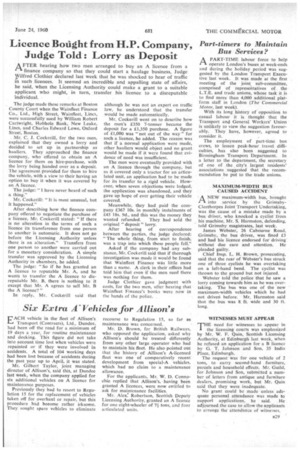Licence Bought from H.P. Company, Judge Told : Lorry as Deposit
Page 35

If you've noticed an error in this article please click here to report it so we can fix it.
AFTER hearing how two men arranged to buy an A licence from a
finance company so that they could start a haulage business, Judge Wilfred Clothier declared last week that he was shocked to hear of traffic in such licences. It ,seemed an incredible and appalling state of affairs, he said, when the Licensing Authority could make a grant to a suitable applicant who might, in turn, transfer his licence to a disreputable individual.
. The judge made these remarks at Boston County Court when the Wainfleet Finance Co., Ltd., High Street, Wainfleet, Lincs, were successfully sued by William Robert Cartwright, Hobhole Bank, New Leake, Lines, and Charles Edward Lowe, Oxford Street, Boston.
Mr. C. J. Cockerill, for the two men, explained that they owned a lorry and decided to set up in partnership as hauliers. They approached the finance company, who offered to obtain an A licence for them on hire-purchase, with the lorry being handed over as a deposit. The agreement provided for them to hire the vehicle, with a view to their having an option to buy it when it was covered by an A licence.
The judge: "I have never heard of such a thing."
Mr. Cockerill: "It is most unusual, but it happened."
After describing how the finance company offered to negotiate the purchase of a licence, Mr. Cockerill stated: " If there is no alteration in the terms of such a licence its transference from one person to another is automatic. It does not go before the Licensing Authority unless there is an alteration." Transfers from one person to another were carried out for a monetary consideration. A simple transfer was approved by the Licensing Authority in chambers, he added.
The judge: "So if he has granted an A licence to reputable Mr. A, and he wants to transfer the A licence to disreputable Mr. B, there is nothing to it except that Mr. A agrees to sell Mr. B the A licence?"
In reply,. Mr. Cockerill said that although he was not en expert on traffic law, he understood that the transfer would be made automatically.
Mr. Cockerill went on to describe how the men's £350 7-tonner became the deposit for a £1,350 purchase. A figure of £1,000 was "not out of the way" for such a licence, he added. The reason was that if a normal application were made, other hauliers would object and no grant would be made if it were found that evidence of need was insufficient.
The men were eventually provided with an A licence through the company, but as it covered only a tractor for an articulated unit, an application had to be made for its transfer to a rigid vehicle. However, when seven objections were lodged, the application was abandoned, and they gave up hope of ever getting their vehicle covered.
Meanwhile, they had paid the company £367 10s. in monthly instalments of £45 18s. 9d., and this was the money they wanted refunded. They had sold the original " deposit " lorry.
After hearing of correspondence between the parties, the judge declared: "The whole thing, from start to finish, was a trap into which these people fell."
Asked if the company had any substance, Mr. Cock erill said that if thorough investigation was made it would.be found that Wainfleet Finance was little more than a name. A clerk in their offices had told him that even if the men sued there was nothing for them.
Judge Clothier gave judgment with costs, for the two men, after hearing that Wainfleet Finance's books were now in the hands of the police.












































































































